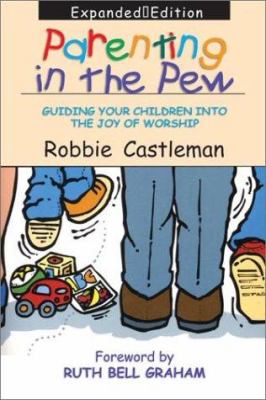
Parenting in the Pew Book Review
In Robbie Castleman’s book, ‘Parenting in the Pew’, she emphasizes to the reader that the purpose of church is the same for a child as it is for the parent: to worship God. The purpose of worshipping God comes as a complete U-turn from the approaches we often take with our kids in church. Sometimes, we find ourselves operating as though (even if Church is for adults to worship) it is for kids to learn. With that, our methods with kids focus on activity/colouring pages in the pew, and Sunday ‘School’ in the basement.
North American culture has contributed a lot to this comfortable arrangement that we as adults have developed with the kids in our midst. We not only feel productive in giving kids a good Christian education, we also spare them the tedious discipline of sitting for 1 hour upstairs. This weekly gathering to worship is a discipline that many of us adults find difficult! A lot of sitting, a lot of waiting, a lot of quiet. We sing, pass the offering plate, partake in communion and sit tight for 30-40 minutes of teaching. Since we know it’s hard for us to maintain this discipline, we are content to give children a “more interesting” option and send them downstairs. Furthermore, when kids are upstairs in the pews, it’s a whole different level of commitment from adults to be actively engaged. When kids are upstairs, we experience all the whispering, wiggling, and ‘wanting to know what is happening’; We aren’t permitted to go on autopilot. ‘Adults upstairs & children downstairs’ is a comfortable arrangement for everyone.
Castleman acknowledges having children “in the pew” is difficult on both ends. She says, “worship can be one of those times when we parents would like to pay attention to something other than our children. Kids can be distracting, aggravating, and embarrassing in church. Parenthood can make sitting in a pew a lot of work” (pg. 17-18). However, Castleman challenges readers that just because it’s difficult does not mean that it’s not important. While having children in the pew is difficult, we need to stretch our understanding of church beyond the immediate challenges and recognize the greater picture of training children to worship God. Castleman says, “parenting in the pew- is entering the house of your heavenly Father and saying, “Daddy, I’d like you to meet my children.” Worship is seeing your Father’s smile” (p. 23). She goes onto explain that worship is about God’s pleasure and blessing, and He deeply values “the presence and praise of children” (p.24-25).
Castleman provides some guidelines on how we can best prepare ourselves for the task of engaging children in the pews.
Here is a list of some of her practical suggestions to “parenting in the pew” that she has personally found formative in her family:
- Begin Preparing your heart Saturday night.
Our children need to hear us say to friends or babysitters, “No, we won’t be too late; we are set to worship God tomorrow morning” (47) - Dressing for Worship
Clothes, shoes and socks for Sunday need to be ready by Saturday evening. Castleman preferred simple attire for her boys without logos and pictures on t-shirts. But having everything set aside the night before was the important part: “Too many Sundays are lost with lost socks” (48) - Engaging Children before hand
A Tithe or a Tip- get children to draw a picture or write their name on an offering envelope to be able to put on the offering plate when it comes around. - Keep it Simple on Sundays
Simple breakfast & lunch allows for spontaneous hospitality with other parishioners (55). She shared how she would give the boys a donut or bagel in the morning and often have soup and sandwiches afterwards. - Share your Anticipation/Excitement with your kids
“Children need to hear how the Lord met us in worship, how much we learned in Sunday School, what we love about our church family. Our children need to see through our behaviour how the Spirit is at work for his purposes in our communities of faith. A heart of gratitude and eyes of faith are easier to have when Sunday is more holy and less hassle. (53) - No bathroom trips during worship.
Going to the bathroom during church was not allowed she and the boys would stop at the bathroom before entering the sanctuary. - Sit Together as a family. Always.
She herself was solo parenting in the pew with her two boys as they grew up so she would sit in the middle and hold the hymnal/bulletin in the middle for the boys to look at together. - Sit away from children who are allowed to have toys and books
The purpose of parenting in the pew is to train a child to worship, not to be quiet. She encourages people to sit “close to the action”. She says children are more attentive when sitting closer to the front.- “While my general recommendation is “no pencils, toys, coloring books, etc.” certain activities can help hyperactive visual learners pay appropriate attention and focus on worship (74)
Regarding engaging Children in specific disciplines/sacraments, Castleman gives the following advice:
- Singing: A parent should try to sing in such a way that the child can hear the song clearly, and when necessary the parent can give instructions… (p. 83)
- Prayer: Involve Children in the corporate prayers of the people. The church needs to hear the prayers of children. The honest prayers of children remind us that our Father knows all the details, all the struggles, all the answers (p. 94)
- Baptism: When adults or children are baptized in a congregation, parents can help their children understand the significance of the event… The story of the day they were baptized can be told and retold… help your older children think through what it means to be baptized (120-121)
- Communion: When children have not yet made a decision to follow Christ a parent can still draw them into the experience. Castleman shares: “As we sat in the pew, or when we knelt at a prayer rail, I would hold the bread and cup in my hands. I had each of the boys cup his hands around mine. With each element I would whisper the mystery of meaning in these sacred symbols as we contemplated them together… I would again hold their hands and tell them that God’s love was extended to them in a special way through Jesus’ death and resurrection. They were drawn into this remembrance with me.” (127)
Castleman does a great job presenting practical ways for families to engage in discipleship and training up of children in worship on Sunday mornings. Her personal stories about solo-parenting in the pew with her boys gives her credibility to families of all shapes and sizes. She is also acknowledges many times her flaws and and weaknesses which give her credibility to any frazzled parent who is reading and thinking “Oh wow, I could never do this!”. According to Castleman, we can!
There are obviously personal stylistic approaches to organization/parenting that not everyone will resonate with in this book. For instance, based on her value of simplicity on Sunday morning, she mentions that she quite often gives her children donuts for breakfast. Then out of the principle of respectfulness, she encourages clean shirts with no logos for her kids. It is easy to see how another parent might make the reverse decisions in these cases. Regarding breakfast, a parent might decide that the value of community & family trumps “easy”. They might decide that it is important for them each Sabbath to gather around the table and have a “feast” together (bacon, eggs, etc). Regarding Sunday morning attire, another parent might value authenticity so much that they encourage their children to dress as they would to visit a good friend! As opposed to say, dressing in a way you would for picture day at school. However, again these are all just stylistic differences. Castleman at no point offers her methods as a law for all parents to follow. Her sharing seems to be done in a Spirit of ‘figure out what is important to you as a family and what works, and then make it happen’.
One thing that is interesting about this book is Castleman’s call to parents to engage children in what has gone on for centuries: the baptisms, the communion, the singing, the sermon… her main point is that children need to be trained in these elements to be prepared for a lifetime of worship. No one can argue that. However, there is no exploration on how maybe those sacraments and disciplines need to be reshaped to appropriately express our culture today. While she did mention that “some” kids might have difficulty with engaging these disciplines, the amount of children who in actuality have difficulty engaging was seriously downplayed! Furthermore, there was no conversation about the amount of adults who cannot engage in worship effectively because of learning styles.
It is essential for the church to rethink worship creatively. It will simply not work for us to raise the bar on our dedication to the traditional approaches to the disciplines and sacraments of worship. There was a slight sense that the call in Parenting in the Pew that the restless people were the problem, not the traditional expressions of the sacraments. But maybe we need to gather around the sacraments and disciplines in new ways? Maybe communion, worship, learning, prayer can all be done in new ways that better engage children and adults of all backgrounds.
Instead of focusing on where kids are seated so that they can hold the hymnal with their parent, or focusing on removing distracting colouring sheets, maybe there are other tweaks we need to make. Maybe we need hand held tools that engage children in new ways. Perhaps as a congregation we employ the use of PICS/PECS to help children with autism engage. There might be space for us to sing differently, to have drum circles or small instruments. Instead of a 40 minute lecture from the pastor maybe we collectively explore a liturgical reading of scripture or drama. Castleman is right, teaching children to worship is essential to the ongoing life and presence of the church. However, as we engage active children with unique needs and adults with kinesthetic tendencies, why not shake up our ‘Pew Life’ a little bit? Sometime disengagement tells us something about the needs of our people not being met.
In sum, Castleman draws readers back to an essential truth that has faded and been lost for many Sunday morning; That is, adults and children need each in worship. And while her advice is, at times, particular to her own style and preferences, her practical advice shows that it is possible to re sift through our values and shape a Sunday morning in a way that will embrace our children worshiping with us. Parenting in the Pew is a great resource to get pastors and parents rethinking the participation of children in worship on Sunday morning. Furthermore, it reminds us that the worship of children is close to God’s heart and His desire for his family. Finally, Castleman is a great resource for churches today as she reminds us that just because something is hard doesn’t mean that its not worth it; A lesson our culture desperately needs today.
“It takes the church to make disciples. Intentional intergenerational development within a church is hard in our culture because it is countercultural. It’s hard because it’s biblical. It’s hard because it’s costly- everyone in the congregation has to die to themselves to be servants to one another under the headship of Christ Jesus”
-Robbie Castleman, Parenting in the Pew, p. 132
Review done by Joanna James


+ There are no comments
Add yours